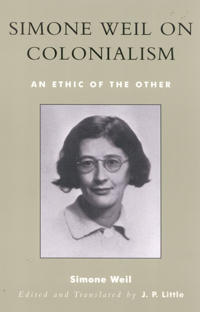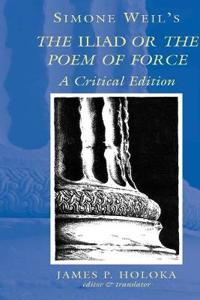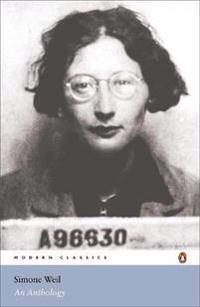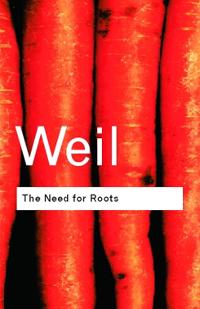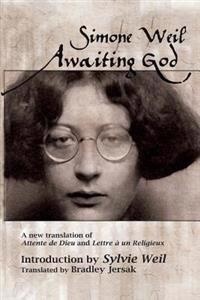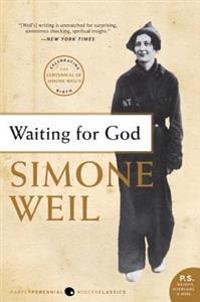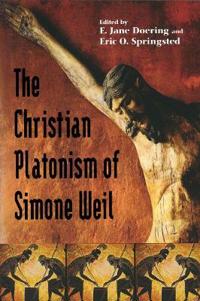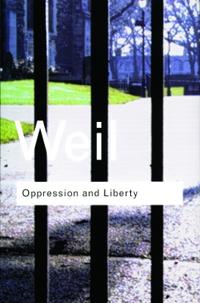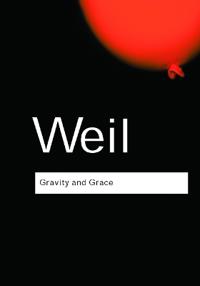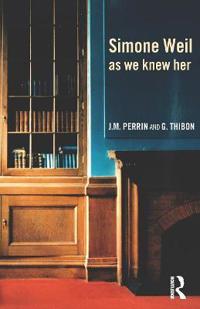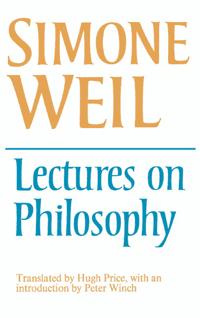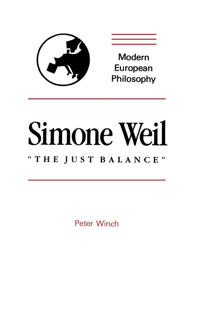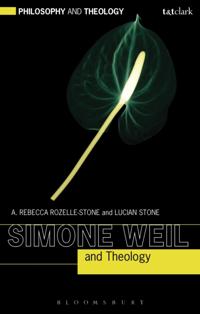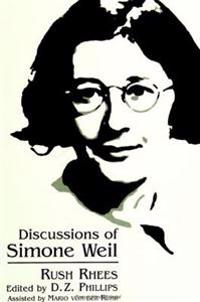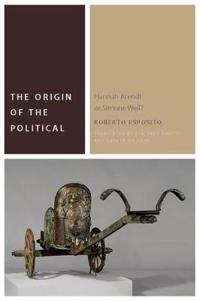Simone Weil on Colonialism (Pocket)
avSimone Weil, J. P. Little, Simone Weil
ISBN: 9780742522831 - UTGIVEN: 2003-08In 1931, Simone Weil read an article by Louis Roubaud in the Petit Parisien that exposed the Yen Bay massacre in Indochina. That article opened Weil's eyes, and from then until her death in exile in 1943, she cared most deeply about the French colonial situation. Weil refused to accept the contradic[...]
Simone Weil's the Iliad or the Poem of Force (Pocket)
avSimone Weil, James P. (EDT) Holoka, Simone Weil
ISBN: 9780820463612 - UTGIVEN: 2003-03Simone Weil (Storpocket)
avSimone Weil
ISBN: 9780141188195 - UTGIVEN: 2005-11Simone Weil was one of the foremost thinkers of the twentieth century: a philosopher, theologian, critic, sociologist and political activist. This anthology spans the wide range of her thought, and includes an extract from her best-known work 'The Need for Roots', exploring the ways in which modern [...]
The Notebooks of Simone Weil (Häftad)
avSimone Weil
ISBN: 9780415758765 - UTGIVEN: 2014-04Simone Weil (1909-1943) was a defining figure of the twentieth century; a philosopher, Christian, resistance fighter, anarchist, feminist, Labour activist and teacher. She was described by T. S. Eliot as 'a woman of genius, of a kind of genius akin to that of the saints', and by Albert Camus as 'the[...]
The Need for Roots (Pocket)
avSimone Weil, Arthur (TRN) Wills, Simone Weil
ISBN: 9780415271028 - UTGIVEN: 2001-11Hailed by Andre Gide as the patron saint of all outsiders, Simone Weil's short life was ample testimony to her beliefs. In 1942 she fled France along with her family, going firstly to America. She then moved back to London in order to work with de Gaulle. Published posthumously The Need for Roots wa[...]
Awaiting God: A New Translation of Attente de Dieu and Lettre a Un Religieux (Häftad)
avSimone Weil, Sylvie Weil, Dr Bradley Jersak
ISBN: 9781927512036 - UTGIVEN: 2013-02Awaiting God (218 pages) combines a fresh translation (by Weil scholar, Brad Jersak) of Simone Weil's 'Waiting for God' and 'Letter to a Priest' (Attente de Dieu and Lettre un Religieux) in one volume. These works are considered Weil's primary essays and letters. In addition, Simone Weil's niece has[...]
Waiting for God (Häftad)
avSimone Weil, Leslie A. Fiedler
ISBN: 9780061718960 - UTGIVEN: 2009-04Emerging from the thought-provoking discussions and correspondence Simone Weil had with the Reverend Father Perrin, this classic collection of essays contains the renowned philosopher and social activist's most profound meditations on the relationship of human life to the realm of the transcendent. [...]
The Christian Platonism Of Simone Weil
ISBN: 9780268025656 - UTGIVEN: 2004-10In this book, a group of renowned international scholars seek to discern the ways in which Simone Weil was indebted to Plato, and how her provocative readings of his work offer challenges to contemporary philosophy, theology, and spirituality. This is the first book in twenty years to systematically[...]
Simone Weil
ISBN: 9780268041502 - UTGIVEN: 2015-09Although trained as a philosopher, Simone Weil (1909-43) contributed to a wide range of subjects, resulting in a rich field of interdisciplinary Weil studies. Yet those coming to her work from such disciplines as sociology, history, political science, religious studies, French studies, and women's s[...]
The SPCK Introduction to Simone Weil (Häftad)
avStephen Plant
ISBN: 9780281059386 - UTGIVEN: 200711Simone Weil was one of the most original philosophers and political thinkers of the twentieth century. During her life her writings were almost unknown beyond a few close friends, only after her death at the age of thirty four did her work reach a wider audience, including Pope John XXIII, Pope Paul[...]
Oppression and Liberty (Häftad)
avSimone Weil
ISBN: 9780415254076 - UTGIVEN: 2001-05The remarkable French thinker Simone Weil is one of the leading intellectual and spiritual figures of the twentieth century. A legendary essayist, political philosopher and member of the French resistance, her literary output belied her tragically short life. Most of her work was published posthumou[...]
Letter to a Priest (Övrig)
avSimone Weil
ISBN: 9780415267670 - UTGIVEN: 2002-04-04Letter to a Priest encapsulates the sharp wit and questioning nature of Simone Weil. Regarded by Susan Sontag as 'one of the most uncompromising and troubling witnesses to the modern travail of the spirit', Weil grips the moral imagination as few others before or since. She was only thirty four when[...]
Gravity and Grace (Häftad)
avSimone Weil
ISBN: 9780415290012 - UTGIVEN: 200209Gravity and Grace was the first ever publication by the remarkable thinker and activist, Simone Weil. In it Gustave Thibon, the farmer to whom she had entrusted her notebooks before her untimely death, compiled in one remarkable volume a compendium of her writings that have become a source of spirit[...]
Simone Weil As We Knew Her
ISBN: 9780415306430 - UTGIVEN: 2004-01Simone Weil (1909-1943) was a defining figure of the twentieth century; a philosopher, Christian (although never baptised), resistance fighter, Labour activist and teacher, described by Albert Camus as 'the only great spirit of our time'. In 1941 Weil was introduced to Father Joseph-Marie Perrin, a [...]
The Notebooks of Simone Weil (Inbunden)
ISBN: 9780415327718 - UTGIVEN: 2003-12Simone Weil (1909-1943) was a defining figure of the twentieth century; a philosopher, Christian, resistance fighter, anarchist, feminist, Labour activist and teacher. She was described by T. S. Eliot as 'a woman of genius, of a kind of genius akin to that of the saints', and by Albert Camus as 'the[...]
Lectures on Philosophy (Häftad)
avSimone Weil
ISBN: 9780521293334 - UTGIVEN: 1978-10Simone Weil?s Leçons de Philosophie are derived from a course she taught at the lycée for girls at Roanne in 1933?4. Anne Reynaud-Guérithault was a pupil in the class; her notes are not a verbatim record but are a very full and, as far as one can judge, faithful rendering, often catching the unmi[...]
Simone Weil "the Just Balance"
ISBN: 9780521317436 - UTGIVEN: 1989-03This book examines the religious, social, and political thought of Simone Weil in the context of the rigorous philosophical thinking out of which it grew. It also explores illuminating parallels between these ideas and ideas that were simultaneously being developed by Ludwig Wittgenstein. Simone Wei[...]
Simone Weil and Theology
ISBN: 9780567424303 - UTGIVEN: 2015-06Simone Weil philosopher, religious thinker, mystic, social/political activist is notoriously difficult to categorize, since her life and writings challenge traditional academic boundaries. As many scholars have recognized, she set out few, if any, systematic theories, especially when it came to [...]
Simone Weil and Theology (Häftad)
avProfessor A.Rebecca Rozelle-Stone
ISBN: 9780567453839 - UTGIVEN: 2013-03Simone Weil - philosopher, religious thinker, mystic, social/political activist - is notoriously difficult to categorize, since her life and writings challenge traditional academic boundaries. As many scholars have recognized, she set out few, if any, systematic theories, especially when it came to [...]
Simone Weil
ISBN: 9780802137296 - UTGIVEN: 2000-09Philosopher, theologian, critic, sociologist, political activist -- Simone Weil was among the foremost thinkers of our time. Best known in this country for her theological writing, Weil wrote on a great variety of subjects ranging from classical philosophy and poetry, to modern labor, to the languag[...]
Simone Weil (häftad)
ISBN: 9780807865743 - UTGIVEN: 2012-06Over fifty years after her death, Simone Weil (1909-1943) remains one of the most searching religious inquirers and political thinkers of the twentieth century. Albert Camus said she had a "madness for truth." She rejected her Jewishness and developed a strong interest in Catholicism, although she[...]
Living up to the Ads (Häftad)
avSimone Weil Davis
ISBN: 9780822324461 - UTGIVEN: 2000-01In "Living Up to the Ads" Simone Weil Davis examines commodity culture's impact on popular notions of gender and identity during the 1920s. Arguing that the newly ascendant advertising industry introduced three new metaphors for personhood - the ad man, the female consumer, and the often female adve[...]
The Origin of the Political: Hannah Arendt or Simone Weil?
ISBN: 9780823276264 - UTGIVEN: 2017-04In this book Roberto Esposito explores the conceptual trajectories of two of the twentieth century's most vital thinkers of the political: Hannah Arendt and Simone Weil. Taking Homer's Iliad--that "great prism through which every gesture has the possibility of becoming public, precisely by being obs[...]

